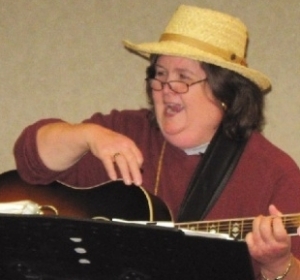Maritime historian shares stories of female pirates
By Bonnie Edwards
Published in News on March 3, 2009 1:46 PM

News-Argus/BONNIE EDWARDS
Historian, artist, musician and storyteller Connie Mason sings one of the pirates' songs Monday night at Wayne Community College during a Wayne County Reads event. The original songs, she said, were more salty than the one she sang.
Historian and storyteller Connie Mason of Morehead City told a Wayne County Reads audience Monday night that female pirates were just as colorful, and dangerous, as their male counterparts.
And despite a widely held belief that women at sea brought bad luck, there were a bunch of them sailing the high seas, said Ms. Mason, who works at the Maritime Museum in Beaufort and researches folklore and historical documents. She is also a musician and artist.
Ms. Mason spoke as part of the Wayne County Reads series, which is centered on the book "Blackbeard: America's Most Notorious Pirate," by Angus Konstam.
In her research, Ms. Mason discovered a queen, a princess and the daughter of a sea merchant who would not let her go on out on one of his ships because of her long hair. So she cut it off and assumed command of his ships and crews. Another female pirate passed herself off as a man, and another member of the same crew was the mistress of the ship's captain. The last two wound up in prison together -- with her pregnant.
Among the first links to women at sea in history was Queen Artemesia who, in 480 B.C., became a pirate off the coast of what is modern day Turkey, Ms. Mason told the audience at Wayne Community College.
The first female pirate to sail the Atlantic was a princess, Alvida, whose father, the leader of what is now Sweden, demanded that she marry a man named Prince Alf.
"I keep conjuring up a picture of the television puppet," Ms. Mason said.
Rather than marry her father's choice, Alvida took to the sea with an all-woman crew. She and her crew were successful pirates. Her father sent Alf looking for the notorious pirate, and the ship was captured. When the helmet came off, there was Alvida.
He proposed. She accepted.
Around the 1580s, Lady Killigrew continued her family's tradition of piracy.
The pirate who cut her hair was Lady Killigrew's contemporary, Grace O'Malley of Ireland. She was so fierce she attacked one of her own sons when he took the side of one of her enemies. But she was a diplomat, too, because when her other son and her half-brother were captured, she gained an audience with Queen Elizabeth and convinced her to set them free.
The most well-known women pirates were late 18th century buccaneers Anne Bonny and Mary Read. Mary Read's parents raised her as a boy to cover up an indiscretion, and she entered the military when she grew up. She went to sea and was captured in 1712 by English pirate Captain Calico Jack, whose mistress was Anne Bonny.
The two women and another pirate -- not the captain -- were the only ones who fought the crew of a Jamaican ship that attacked their boat in October 1720. Everyone else hid below deck.
When sentenced to death, Ms. Mason said, the women both turned up pregnant and got a reprieve. But their captain went to the gallows.
The last words Calico Jack heard were from the lips of his mistress were, "I am sorry to see you there, but if you had fought like a man, you would not have to die like a dog."
But the greatest pirate in history, male or female, said Ms. Mason, was a Chinese woman, Hsi Kai Ching Yih, who commanded 2,000 vessels and 50,000 pirates.
The next Wayne County Reads event will be Thursday at 7 p.m. in Room 101 of the Walnut Building at Wayne Community College, with Julius Nyang'oro, a professor at the University of North Carolina at Chapel Hill, who will discuss the exploits of modern piracy.
Wrapping up the Wayne County Reads season will be a performance of the play, "Hot Grog." The first production will be a dinner theater at 6:30 p.m. March 19 at the Goldsboro Country Club.
The musical comedy, written by Bland Simpson and Jim Wann, is based on true pirates who roamed the North Carolina coast in Colonial times.
Tickets are $30 for the dinner theater. For 8 p.m. performances on March 20 and 21 and a 3 p.m. matinee on March 22, the tickets are $5 each for adults and $2 for students. WCC students get in free with their college identification.
For information on the dinner theater, call 736-3300 or 735-1824. And for information about the college performances, call 735-5151.
